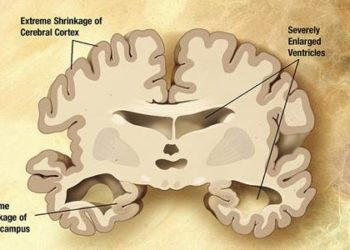Rare APOE missense variants V236E and R251G associated with substantial reduction in risk of Alzheimer disease
1. APOE ε3 (V236E) and APOE ε4 (R251G), 2 rare missense genetic variants, both had a substantial association with reducing the risk of Alzheimer disease.
2. These findings further validated the protective effect of the V236E variant and has revealed a novel protective missense variant on APOE ε4.
Evidence Rating Level: 3 (Average)
Study Rundown: Late-onset Alzheimer disease (AD) has been strongly linked to the protective APOE ε2 and risk-increasing APOE ε4 alleles, however, the mechanism and pathogenesis behind this is poorly understood. This genetic association study examined the association between rare missense variants on APOE with risk of AD. The main outcome was the estimated AD risk associated with each missense variant, where secondary analysis evaluated associations with age at onset and risk of conversion to AD. Among 544 384 participants, including 67 896 patients with AD, 28 484 with proxy-AD, and 340 306 controls, 2 rare missense genetic variants – APOE ε3 [V236E] and APOE ε4 [R251G] – significantly reduced the risk of AD by >60% and >50%, respectively. These findings further validated the protective effect of the V236E variant and has revealed a novel protective missense variant on APOE ε4. A limitation of this study was the lack of a direct clinical diagnosis of AD in the UK Biobank cohort that was included in the analysis.
Click to read the study in JAMA Neurology
Click to read an accompanying editorial in JAMA Neurology
Relevant Reading: APOE and dementia—resequencing and genotyping in 105,597 individuals
In-Depth [case-control]: This genetic association study included 544 384 participants (312 476 [57.4%] female; mean [SD] age, 64.9 [15.2] years) between September 2015 and November 2021. The study combined case-control, family- and population-based, and longitudinal AD-related cohorts. Stage 1 (sequenced discovery) included 11 868 individuals with AD and 11 934 controls. Stages 2 and 3 included 84 513 individuals with AD and proxy-AD and 328 372 controls from microarray imputed and UK Biobank whole-exome sequencing cohorts. Overall, 2 missense variants were associated with a 2 to 3-fold decreased AD risk: APOE ε4 (R251G) (OR, 0.44; 95%CI, 0.33-0.59; P = 4.7 x 10−8) and APOE ε3 (V236E) (OR, 0.37; 95%CI, 0.25-0.56; P = 1.9 x 10−6). Compared with noncarriers, the cumulative incidence of AD in carriers of these variants was found to grow slower with age.
Image: PD
©2022 2 Minute Medicine, Inc. All rights reserved. No works may be reproduced without expressed written consent from 2 Minute Medicine, Inc. Inquire about licensing here. No article should be construed as medical advice and is not intended as such by the authors or by 2 Minute Medicine, Inc.







